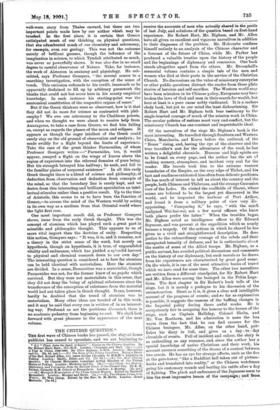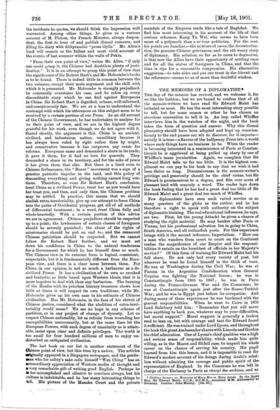1 .1.11.b CHINESE QUESTION.*
Tax first wave of Chinese books has passed, the stay-at-home publicist has ceased to speculate, and we are beginning to
Sir Ift,t Hart, Bert., G.C.DI.G. London : Chapman and Hall [88.] —(2.) • igo.) "These from the Land of Sinim" : Essays on the Chinese Question. By A ear in China, 1899-1900. By Clive Bighorn, C.M.G. London : Macmillan mid Co. [Be. 6d. net.1—(3.) The Siege of the Peking Legations. Being a Diary of the Bev. Boland Alim, five years Acting Chaplain to H.11.111.'s Legation in Peking. London : Smith, Elder, and Co. [7s. 65 ]--(4.) The Heat Chinese Question. By Chester Holcombe, sometime Acting Minister of the United States at Peking. London : Methuen and Co. (6e.]—(5.) China : her History, Diplomacy, and Cominerree, from the Earliest Times to the Present Day. By E. H. Parker, formerly H.M. Consul at Biungchow. London : J. Murray. [Se. net.] —(6.) Martyred Missionaries of the China In/and Mission. Edited by Marsha. Broomhall. London Morgan and Scott. [5s.]--(7.) The Chinese Crisis from Within. By Wen Ching. Edited by the Bev. G. M. Beni'. London : Grant Richards. N.61.]
_ receive the accounts of men who actually shared in the perils of last July, and solutions of the question based on first-hand experience. Sir Robert Hart, Mr. Bighorn, and Mr. Allen have all given us excellent and vigorous narratives in addition to their diagnoses of the problem. Mr. Holcombe confines himself entirely to an analysis of the Chinese character and a forecast of the future of China, while Mr. Parker has produced a valuable treatise upon the history of the people and the beginnings of diplomacy and commerce. Ohe'book stands altogether apart from the others. Mr. Broondiall's memorial volume contains a simple tale of the men and women who died at their posts in the service of the Christian Church. No discussions on the value of missionary enterprise or other public questions distract the reader from these plain stories of heroism and self-sacrifice. The Western world may have been mistaken in its Chinese policy, Europeans may have broken the laws of God and man in their search for wealth, but here at least is a pure cause nobly vindicated. It is a melon. choly book, but yet to our mind the least disheartening. Sir Robert Hart mid Mr. Bighorn both bear testimony to the single-hearted courage of much of the mission work in China. The secular policies of nations must vary and conflict, but the missionary: Church has one constant and imperishable ideal.
Of the narratives of the siege Mr. Bighorn's book is the most interesting. He travelled through Southern and Western Chins, Manchuria, and Korea before the outbreak of the " Boxer " rising, and, having the eye of the observer and the true traveller's zest for the adventures of the rood, he has written a delightful chronicle. Humour and high spirits are to be found on every page, and the author has the art of making scenery, atmosphere, and incident very real for the reader. His travels took him to the extreme western boundaries of the Empire, on the very edge of Thibet, and his tact and readiness extricated him often from delicate positions; He has much of interest to tell us about the country and the people, both Chinese and Thibetans, and the strange Caucasian race of the Lobos. He visited the coalfields of Shansi, whose seams are believed to be the largest yet discovered in the world, and he inspected the harbour of Port Arthur, and found it from a military point of view very appointing. "Comparing it," he says, "with the much maligned Wei-hai-wei, not a few naval officers who know both places prefer the latter." When the troubles began Mr. Bighorn acted as intelligence officer to Sir Edward Seymour, and was present at the expedition which so nearly became a tragedy. Of the actions in which he shared he has given us a vivid and straightforward description. He does justice to the extraordinary courage of the rebels and their unexpected tenacity of defence, and he is enthusiastic about the merits of some of the Allied troops. Mr. Bighorn, as a public servant, has avoided political discussions and comments on the history of our diplomacy, but such morals as he draws from his experiences are characterised by great good sense. On the whole, it is one of the most attractive books of travel which we have read for some time. The other two narratives are written from a different standpoint, for Sir Robert Hart and Mr. Allen were among the besieged in the Pekin Lega- tions. The first chapter in Sir Robert's book tells of the siege, but it is merely a prologue to his discussion of the reconstruction. Short as it is, it gives a clear and intelligible account of the progress of events; and so far as explanation is possible, it suggests the reasons of the baffling changes in the Imperial policy during those awful weeks. He is scrupulously fair in assigning due honour, to the heroes of the siege, such as Captain Halliday, Colonel Sheba, and Mr. Von Rosthorn, and his admiration is none the less warm from the fact that he can find excuses for the Chinese besiegers. Mr. Allen, on the other hand, pub- lishes his diary in full, and gives us a day - to - day chronicle of events. Full of incident and colour, the story is as enthralling as any romance, and, since the author has a special knowledge of native Christians and their work, his account assumes something of the drama of a contest betweeu two creeds. He has an eye for strange effects, such as the fire at the gate-tower, "like a Buddhist hell taken out of picture- books and translated into reality," or the Chinese watchman going his customary rounds and beating his rattle after a day of fighting. The pluck and endurance of. the Japaneseiseedi to him the most impressive lesson of the campaign; and from
the incidents he quotes, we should think the impression well warranted. Among other things, he gives us a curious account of M. Pichon, the French Minister, always despon- dent, the first to hear of and publish dismal rumours, and filling his diary with dithyrambic "prose idylls." Mr. Allen's book will remain as the fullest and most vivid account of the events of last summer within the walls of Pekin.
"From their own point of view," writes Mr. Allen, "if only one could grasp it, the Chinese had doubtless plenty of justi- fication." It is in an attempt to grasp this point of view that the significance of Sir Robert Hart's and Mr. Holcombe's books
113 to be found. There is indeed little in common between the two volumes, except their main argument and the skill with which it is presented. Mr. Holcombe is strongly prejudiced, he constantly overstates his case, and he rakes up every
discreditable story which he can find against Europeans in China. Sir Robert Hart is dignified, urbane, well-informed, and conspicuously fair. We are at a loss to understand the contempt with which his utterances on this subject seem to be received by a certain portion of our Press. As an old servant of the Chinese Government, be has undertaken to analyse for
us their point of view, and we are in the highest degree grateful for his work, even though we do not agree with it.
Stated shortly, the argument is this. China is an ancient, civilised, and industrious nation, unmilitary because it has always been ruled by right rather than by might, and conservative because it has outgrown any craze for reforms. Europeans came and demanded a share in its trade; it gave it them, for it had no love for quarrels. They demanded a share in its territory, and for the sake of peace it has given them that also. But there is a limit even to Chinese forbearance, the " Boxer " movement was a sign of a genuine patriotic impulse in the land, and this policy of demanding everything and giving nothing cannot long con- tinue. Therefore, so runs Sir Robert Hart's conclusion, treat China as a civilised Power, treat her as you would have her treat you, and then, and only then, the Chinese problem may be settled. In practice, this means that we should abolish extra-territoriality, give up our attempt to force China into the paths of Occidental progress, get rid of all methods of differential treatment : in a word, trust China fully and whole-heartedly. With a certain portion of this advice we are in agreement. Chinese prejudices should be respected up to a point; the lawlessness of certain classes of foreigners should be severely punished ; the abuse of the rights of
missionaries should be put an end to ; and the renascent Chinese patriotism should be respected. But we cannot
follow Sir Robert Hart further, and we must set down his confidence in China to the natural tenderness for a Government for which he has himself done so much. The Chinese view in its extreme form is logical, consistent, respectable, but it is fundamentally different from the Euro- pean view, and there is a clear issue between them. For China, in our opinion, is not so much a barbarous as a de- civilised Power. It has a civilisation of its own so crooked and fantastic, so little based upon Western ideals, that it is more hopeless to deal with than any barbarism. The burning of the Hanlin with its priceless literary treasures shows how little at times it will respect its own traditions, while Mr.
Holcombe gives up his own case in his estimate of Chinese civilisation. Has Mr. Holcombe, in the face of his sketch of Chinese justice, considered what the abolition of extra-terri-
toriality would mean? We see no hope in any scheme of
partition, or in any project of change of dynasty. Let us respect Chinese nationality, let us refrain from wounding her susceptibilities unnecessarily, but at the same time let the European Powers, with such degree of unanimity as is attain- able, insist upon clear and definite privileges. The world is too small for four hundred millions of men to enjoy un- disturbed an antiquated civilisation.
The last book on our list is another statement of the Chinese point of view, but this time by a native. The articles originally appeared in a Singapore newspaper, and the gentle- man who for safety's sake calls himself "Wen Ching" has an Icrtraordinary appreciation of Western modes of thought and • very remarkable gift of writing good English. Perhaps he ill too accomplished and allusive to convince always, but his culture is indubitable, and he has many interesting things to tell. His picture of the lianchu Court and the private
scandals of the Empress reads like a tale of Baghdad. We find him most interesting in his account of the life of that curious reformer, Kang Yu Wei, who seems to have been more of a polymath than a se-ious politician. For the rest, his points are familiar,—the mixture of races, the decentralisa- tion, the genuine Chinese grievances, and the old weary story of diplomacy. His solution, so far as he cares to dogmatise, is that now the Allies have their opportunity of settling once and for all the status of foreigners in China, and that the time is ripe for a reasonable compromise. His alternative suggestion—to take sides and put our trust in the literati and the reformers—seems to us of more than doubtful wisdom.







































 Previous page
Previous page